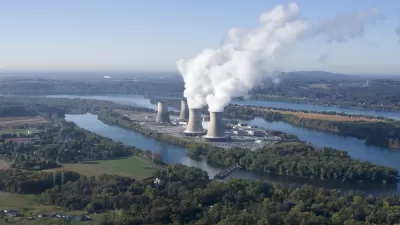The president hopes to revitalize the nation's sagging coal industry by forcing utilities to purchase power from aging coal and nuclear power plants in the name of national defense. The news is already paying dividends for coal companies.

Jennifer A. Dlouhy, an energy reporter for Bloomberg News, describes a directive from President Donald to Department of Energy Secretary Rick Perry to order grid operators to purchase electricity from coal and nuclear power plants that may be uncompetitive with newer plants burning natural gas and using renewable energy.
The department’s strategy, outlined in a memo [dated May 29] obtained by Bloomberg News, would use authority granted under a pair of federal laws to establish a “strategic electric generation reserve” and compel grid operators to buy electricity from at-risk plants. The steps are necessary, the memo says, to protect national security.
The memo's contents were essentially confirmed by White House spokeswoman Sarah Sanders in a June 1 emailed statement:
“Impending retirements of fuel-secure power facilities are leading to a rapid depletion of a critical part of our nation’s energy mix and impacting the resilience of our power grid." Trump has directed Perry “to prepare immediate steps to stop the loss of these resources and looks forward to his recommendations.”
The plants are considered “fuel-secure” because they house coal and nuclear material on site and are not dependent on pipelines that can be disrupted, wind that stops blowing or a sun that sets.
The news is already having a positive effect on the coal industry, shown by rising stock prices for Peabody Energy Corp, Arch Coal Inc. and Consol Energy Inc.
Under the Energy Department’s draft plan, the administration would take action under two laws: the Federal Power Act that allows the government to guarantee profits for power plants amid grid emergencies, and the 68-year-old Defense Production Act, a Cold War-era statute once invoked by President Harry Truman to help the steel industry.
Legal challenge inevitable
"The Energy Department and the administration is routing its argument here [in] national security probably partly for legal reasons to help buffer them from a legal challenge down the road," Dlouhy tells Hari Sreenivasan, anchor of PBS NewsHour Weekend (video and transcript) on June 2. "But the Energy Department’s own analysis has found that the grid is more reliable because it has power coming from a wider array of sources."
Cost?
On June 3, the Bloomberg editorial board asked what the directive will cost.
Not in climate terms, although here the indirect costs could be greatest in the long run.
And not in terms of public health, although air pollution from a single coal plant causes hundreds of asthma attacks and dozens of premature deaths every year.
They suggest that the Trump administration determine the costs, which isn't noted in the memo, and that it should be of national concern as it will be paid by directly American ratepayers, unlike the aforementioned externalities.
The chief beneficiaries of Trump’s plan would be coal-plant operators and their suppliers, a group that includes some of the president’s top supporters. The losses for everybody else — in higher emissions of carbon, additional premature deaths, and higher outlays on electricity — would be far greater. Dirty energy at higher cost: That’s some deal.
FULL STORY: Trump Orders Action to Stem Coal, Nuclear Plant Shutdowns

Alabama: Trump Terminates Settlements for Black Communities Harmed By Raw Sewage
Trump deemed the landmark civil rights agreement “illegal DEI and environmental justice policy.”

Planetizen Federal Action Tracker
A weekly monitor of how Trump’s orders and actions are impacting planners and planning in America.

How Atlanta Built 7,000 Housing Units in 3 Years
The city’s comprehensive, neighborhood-focused housing strategy focuses on identifying properties and land that can be repurposed for housing and encouraging development in underserved neighborhoods.

In Both Crashes and Crime, Public Transportation is Far Safer than Driving
Contrary to popular assumptions, public transportation has far lower crash and crime rates than automobile travel. For safer communities, improve and encourage transit travel.

Report: Zoning Reforms Should Complement Nashville’s Ambitious Transit Plan
Without reform, restrictive zoning codes will limit the impact of the city’s planned transit expansion and could exclude some of the residents who depend on transit the most.

Judge Orders Release of Frozen IRA, IIJA Funding
The decision is a victory for environmental groups who charged that freezing funds for critical infrastructure and disaster response programs caused “real and irreparable harm” to communities.
Urban Design for Planners 1: Software Tools
This six-course series explores essential urban design concepts using open source software and equips planners with the tools they need to participate fully in the urban design process.
Planning for Universal Design
Learn the tools for implementing Universal Design in planning regulations.
Jessamine County Fiscal Court
Caltrans
Institute for Housing and Urban Development Studies (IHS)
City of Grandview
Harvard GSD Executive Education
Toledo-Lucas County Plan Commissions
Salt Lake City
NYU Wagner Graduate School of Public Service




























